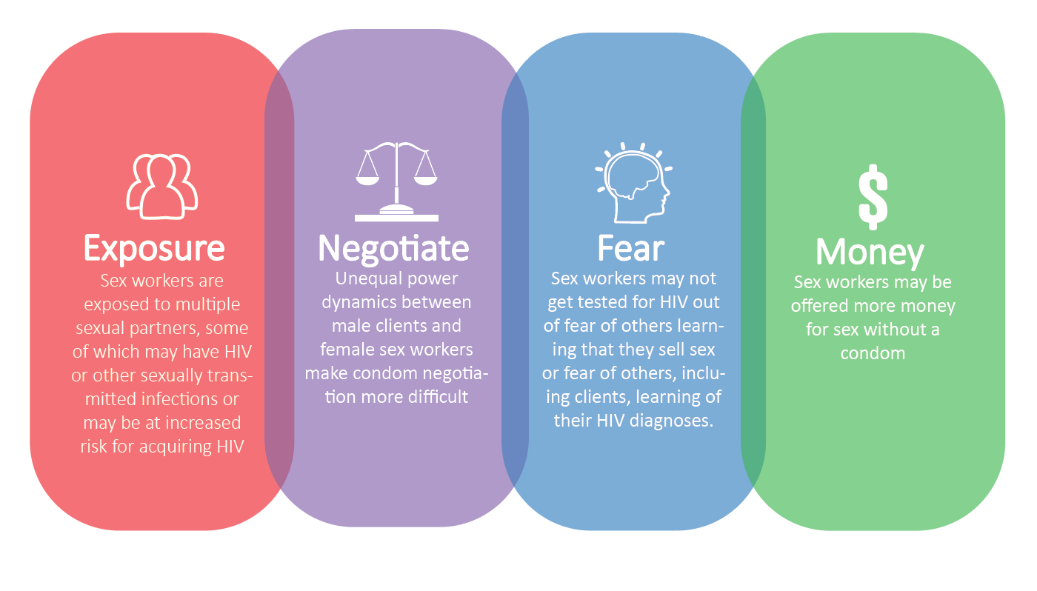Decreasing violence, stigma, and discrimination among female sex workers in Kenya
Akinyi* is a sex worker living in Kiambu, Kenya. She is one of approximately 167,900 female sex workers (FSWs) in Kenya who exchange sex for money or other goods, often to support themselves and their families. Sex work puts women like Akinyi at odds with the law and societal norms and introduces serious risks to their health and safety. One such risk is HIV. Sex work can increase the risk of acquiring HIV in the following ways:
- FSWs are exposed to multiple sexual partners, some of whom may have HIV or some other sexually transmitted infection or may be at increased risk for acquiring HIV;
- FSWs may be offered more money for sex without a condom;
- Unequal power dynamics between male clients and FSWs make condom negotiation more difficult;
- FSWs may not get tested for HIV out of fear of others learning that they sell sex or fear of others – including clients – learning of their HIV diagnosis.
In Kenya, almost one in three FSWs have HIV, which is more than 6-times higher than the rate among the general population. FSWs are also more likely to endure gender-based violence due to the stigma associated with sex work.

Exposure – Sex workers are exposed to multiple sexual partners, some of which may have HIV or other sexually transmitted infections or may be at increased risk for acquiring HIV.
Negotiate – Unequal power dynamics between male clients and female sex workers make condom negotiation more difficult.
Fear – Sex workers may not get tested for HIV out of fear of others learning that they sell sex or fear of others, including clients, learning of their HIV diagnoses.
Money – Sex workers may be offered more money for sex without a condom.
Akinyi owns a bar that she uses as a meeting space for a small group of FSWs who are part of a savings group. The group meets regularly to make loans and repayments to the group fund, as needed. Recently, the local police entered the bar and assaulted the women with batons upon learning that this group of FSWs were meeting at the bar. The women suffered injuries and trauma as a result of this attack which was a violation of human rights against women in the most vulnerable form of informal work. Because FSWs are not recognized in the informal economy, they often do not have access to legal or social protection.
LVCT Health is a Kenyan non-governmental organization funded by and working in collaboration with CDC Kenya to provide post-violence services alongside HIV prevention and treatment services to populations in Kenya who are at increased risk for HIV, including FSWs. Between October 2019 and September 2020, the organization reached 27,324 sex workers, who were all screened for gender-based violence (GBV). Among them, more than one-third were found to have experienced GBV and were offered post-GBV services. One of the post-GBV services LVCT Health offers is basic legal support provided by paralegals. LVCT Health also provides first-line support to all survivors of violence.
LVCT Health has trained 54 paralegals operating in eight counties in Kenya as part of CDC-funded HIV prevention projects and has provided sensitivity training to law enforcement officers to reduce stigma and discrimination against sex workers and help them appropriately respond to reports of violence. Zebra, a FSW who received training from LVCT Health to become a paralegal, provided first line response to Akinyi and her peers at the scene of the attack by using the World Health Organization’s LIVES (Listen, Inquire, Validate, Enhance Safety, and Support) strategy to provide immediate psychological support and offer referrals for other post-violence care services.
As a result of the collaboration between CDC Kenya and LVCT Health, 2,267 FSWs have gained access to basic legal support, and 262 law enforcement officials have received sensitivity training on how to respond to violence among stigmatized groups. These trainings for law enforcement officers reduced stigma towards FSWs and improved their response to reports of violence among FSWs leading to an increase in the number of FSWs who felt safe reporting violence and seeking post-violence services. LVCT Health has demonstrated a commitment to supporting these women workers and empowered them to report GBV, which has resulted in a 94% increase in GBV cases being reported.
*Pseudonym
- ‘Champions for Change’ Initiative in Kenya Brings Together Community to Speak Out Against Gender-based Violence
- CDC Training Helps Healthcare Providers Respond to Gender-Based Violence
- Decreasing violence, stigma, and discrimination among female sex workers in Kenya
- Preventing Gender-based Violence through Economic Opportunity